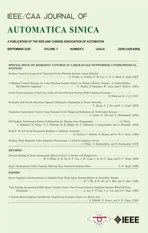Resilient Control in Large-Scale Networked Cyber-Physical Systems: Guest Editorial
2020-02-12GiuseppeFranzGiancarloFortinoXianghuiCaoGiuseppeMariaLuigiSarnZhenSong
Giuseppe Franz`e, Giancarlo Fortino, Xianghui Cao, Giuseppe Maria Luigi Sarn`e, Zhen Song
RECENT advances in sensing, communication and computing have open the door to the deployment of largescale networks of sensors and actuators that allow fine-grain monitoring and control of a multitude of physical processes and infrastructures. The appellation used by field experts for these paradigms is Cyber-Physical Systems (CPS) because the dynamics among computers, networking media/resources and physical systems interact in a way that multi-disciplinary technologies (embedded systems, computers, communications and controls) are required to accomplish prescribed missions.Moreover, they are expected to play a significant role in the design and development of future engineering applications such as smart grids,transportation systems,nuclear plants and smart factories.
This special issue deals with the opportunities offered by these emerging technologies to mitigate undesired phenomena arising when intentional jamming and false data injections,categorized as cyber-attacks, infer communication channels.As it is well-known, the main consequence is that measurement and actuator data integrity and availability might be compromised with a significant degradation of the control performance [1]−[4].
The goal of this special issue is to provide new ideas and solutions when cyber-attack countermeasures or resilient control strategies are concerned. Along these lines, secure/robust and resilient control frameworks for networked control system(NCS)configurations capable to jointly take care of state/input constraints under cyber-attack occurrences on the communication medium are of noticeable interest. Accordingly, trust management, cyber-attacks in smart grids, internet of things systems of systems and applications in emerging domains(e.g. Internet of Vehicles, Smart Cities) assume a relevant importance in the new Industry 4.0 era [5]−[7].
The special issue has been conceived as follow-up of the IEEE International Conference on Control Decision and Information Technologies 2019,Paris(Fra),April 2019,and to address some of the aforementioned issues. The seven articles in this special issue combine extended and revised papers accurately selected as best papers among those presented at CodiT 2019 with new contributions. The selected papers address many research challenges in the field of the resilient control for networked cyber-physical systems.Specifically,the main topics include: set-theoretic approaches for constrained regulation problems in networked multi-agent systems subject to denial-of-service(DoS)attacks,secure synchronization control problems for a class of CPSs subject to intermittent DoSs, collaborative estimation processes in sensor networks,formation-containment control based on a dynamic eventtriggering mechanisms for multi-agent systems collaborative wireless autonomous systems network frameworks for disaster area management, trust oriented architectures for agents operating in IoT environments, fault diagnosis tool in smart industrial systems [8]−[9].
The paper “A Resilient Control Strategy for Cyber-Physical systems Subject to Denial of Service Attacks: A Leader-Follower Set-Theoretic Approach” [10] by Giuseppe Franz`e,Domenico Famularo, Walter Lucia and Francesco Tedesco,presents a distributed model predictive control algorithm to formally address constrained regulation problems arising in networked multi-agent systems when external actors maliciously affect the normal operation mode. By exploiting ideas borrowed from the set-theoretic approach, sequences of onestep controllable sets have been adequately determined in order to take care of time-varying leader-follower configurations.
The paper “Secure Synchronization Control for a Class of Cyber-Physical Systems with Unknown Dynamics” [11] by Ning Wang and Xiaojian Li, authors investigate the secure synchronization control problem for CPSs subject to intermittent DoS attacks.The considered CPSs are modeled as a class of complex dynamical networks with unknown dynamics.
The paper “Stochastic DoS Attack Allocation Against Collaborative Estimation in Sensor Networks” [12] by Ya Zhang,Lishuang Du and Frank L. Lewis, proposes a stochastic scheduling and attack power allocation scheme from the perspective of the energy-constrained DoS attacker, so as to influence the estimation of the collaboratively working sensor network with minimum attack energy cost. Necessary condition and sufficient conditions on the packet loss probabilities of the channels in the attack set are also provided.
The paper“Formation-Containment Control Using Dynamic Event-Triggering Mechanism for Multi-Agent Systems” [13]by Amir Amini,Amir Asif and Arash Mohammadi,presents a novel approach for formation-containment control based on a dynamic event-triggering mechanism for multi-agent systems.The leader-leader and follower-follower communications are reduced by utilizing the distributed dynamic event-triggered framework.
In the paper “IoT-Enabled Autonomous System Collaboration for Disaster-Area Management”[14]by Abenezer Girma,Niloofar Bahadori, Mrinmoy Sarkar, Tadewos G. Tadewos,Mohammad R.Behnia,M.Nabil Mahmoud,Ali Karimoddini,and Abdollah Homaifar, the authors develops a collaborative wireless autonomous systems network architecture for disaster area management. The framework enables synergy between heterogeneous autonomous system for assisting human agents to safely investigate post-disaster areas in a timely manner.
The paper entitled “ResIoT: An IoT Social Framework Resilient to Malicious Activities”[15]by Giancarlo Fortino,Fabrizio Messina, Domenico Rosaci and Giuseppe M. L. Sarn`e,presents a new reputation based framework for IoT agents,called Resilient IoT (ResIoT), having the social capability to form agent local communities. ResIoT has been specifically designed to be resilient to a certain kind of malicious attacks. ResIoT has been conceived for all those IoT scenarios formed by federated environments in which heterogeneous devices,provided of limited computational,storage and power resources, are free to move between domains and where cooperation exploits the formation of social structures based on the widespread reputation in the network.
The paper entitled “Resilient Fault Diagnosis Under Imperfect Observations–A Need for Industry 4.0 Era” [16]by Alejandro White, Ali Karimoddini and Mohammad Karimadini, provides a diagnosis technique which is capable of diagnosing faults under imperfect observations.A new concept of asynchronous detectability is introduced, which, if holds,allows to detect a miss observation from its post observations.
We hope that the seven papers included in this special issue will provide valuable knowledge for those researchers and practitioners working in the area of robust and resilient control and related applications.
Finally, we would like to thank to Prof. Mengchu Zhou,Editor-in-Chief of the IEEE/CAA Journal of Automatica Sinica and Dr. Yan Ou, for their continuous support and encouragement for the development of this special section. We would like also to thank the anonymous reviewers who reviewed the seven papers by providing constructive feedback useful to improve the quality of the final papers.
